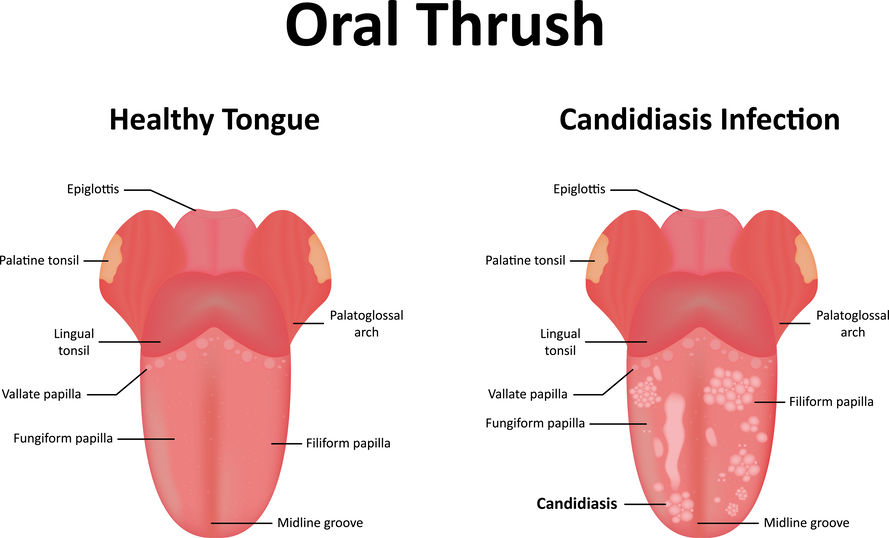What is oral thrush?
Oral thrush is a common fungal infection of the mouth and throat, most often caused by Candida albicans. The medical name for this is oropharyngeal candidiasis. Thrush can occur in any age group, ranging from infancy to adulthood. Babies and adults with certain health conditions, like weakened immune systems, diabetes or dentures, are more likely to get thrush than adults without these conditions. Certain medications, like inhaled corticosteroids (Exs. Advair, Flovent, Qvar, Dulera), may also put someone at risk for thrush. It is important to rinse your mouth out after use of these types of inhalers to help prevent thrush.
What are the symptoms of thrush?
Symptoms and signs of oral thrush include:
- Cottony feeling in the mouth
- Loss of taste
- Pain during eating and swallowing (more rare)
- Additional infection of the esophagus or throat in people with weak immune systems (called esophagitis or laryngeal candidiasis) – may present itself as hoarseness
- White plaques on the tongue or around the mouth and throat (just having a white coating on the tongue may not be thrush)
How long does thrush last without treatment?
Without treatment, oral thrush may resolve in about three to eight weeks on its own. However, untreated oral thrush may also lead to more serious types of infections, so it is important to seek treatment to prevent more serious infections. This is especially important in those people who have other health conditions like weak immune systems or diabetes.
See Dr. Peter Rice’s adventure when his grandchild had oral thrush.
How is oral thrush treated?
Mild cases of thrush may be treated with one of the following, which are typically prescribed for 7 to 14 days:
- Clotrimazole troches five times daily
- Miconazole buccal tablets daily
- Nystatin liquid four times daily (swish and swallow)
Also see our blog: Can Oral Thrush Be Treated Over-the-Counter?
In more severe cases, or for people who do not see resolution with the previously described treatments, oral therapy may be used for 7 to 14 days. Oral treatment for thrush may include:
- Fluconazole (preferred)
- Should not be used in the first trimester of pregnancy – clotrimazole, miconazole, or nystatin are preferred at any stage in pregnancy
- Itraconazole
- Posaconazole
- Voriconazole
Resources:
UpToDate
https://pedclerk.bsd.uchicago.edu/page/thrush-oral-candidiasis












